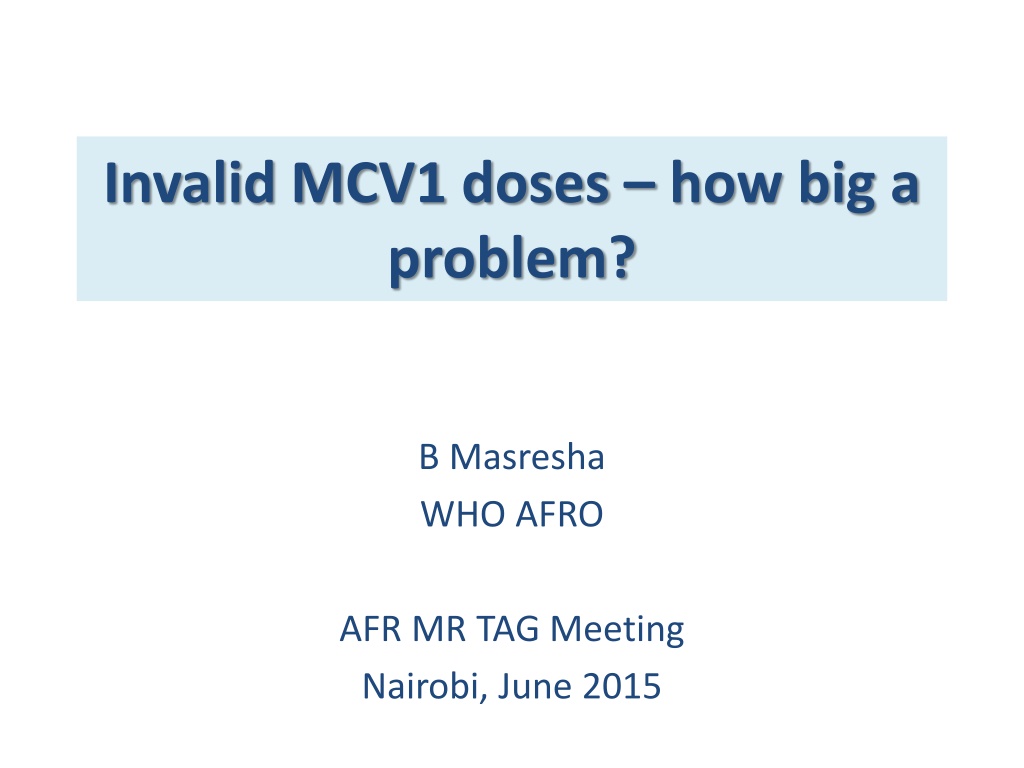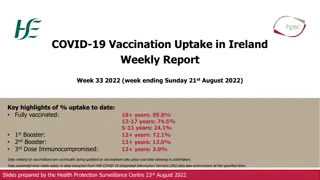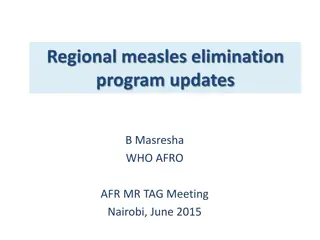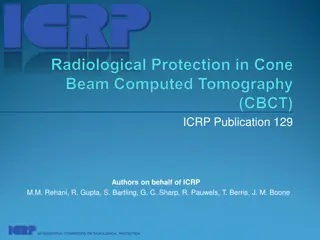Analysis of Invalid MCV1 Doses: A Critical Review
The analysis delves into the issue of invalid MCV1 doses in African countries, highlighting delayed vaccination schedules, policy inconsistencies, and the impact on vaccine response. Findings reveal a substantial proportion of children receiving vaccines outside recommended guidelines, necessitating a closer examination of vaccination practices and policies.
Download Presentation

Please find below an Image/Link to download the presentation.
The content on the website is provided AS IS for your information and personal use only. It may not be sold, licensed, or shared on other websites without obtaining consent from the author.If you encounter any issues during the download, it is possible that the publisher has removed the file from their server.
You are allowed to download the files provided on this website for personal or commercial use, subject to the condition that they are used lawfully. All files are the property of their respective owners.
The content on the website is provided AS IS for your information and personal use only. It may not be sold, licensed, or shared on other websites without obtaining consent from the author.
E N D
Presentation Transcript
Invalid MCV1 doses how big a problem? B Masresha WHO AFRO AFR MR TAG Meeting Nairobi, June 2015
Outline Age of MCV1 administration analysis of DHS data Country examples Desk review of national immunisation policies Conclusion Way forward Questions to the TAG
Policies for MCV1 administration Recommended age At 9 months of age in all but 2 member States (MAS, SEY) Starting at 6 months in outbreaks, but not to be recorded as MCV1 invalid dose which may result in a suboptimal vaccine response, if premature vaccinations, i.e. vaccinations administered earlier than recommended and Vaccinations administered with inappropriately short intervals between vaccine doses.
Median ages and percentile distribution of age at MCV1 in AFR. DHS data 1996 2004.
Findings from analysis of 1996 2004 DHS data Average median age at MCV1 vaccination is 41.6 weeks (2.6 weeks delayed), [range: 1 - 5 weeks] 75thpercentile delays; median at 8.4 weeks [range 4.4 - 22.4 weeks after the schedule] 75thpercentile of distribution of age of MCV1 >/= 45 weeks of age in 19 of 26 countries Large majority of children are not vaccinated on schedule. A large proportion of children will be significantly delayed in being vaccinated (25% measles vaccines >2 months late).
Analysis using recent DHS data Manas K. Akmatov et al. Evaluation of invalid vaccine doses in 31 countries of the WHO African Region . Vaccine 33 (2015) 892 901 DHS data from 31 countries in AFR, (2003 2013) Review of records of 134,442 children with vaccination cards
Number of countries and the proportion of invalid MCV1 doses
Proportion of invalid MCV1 doses and 95% confidence intervals by country. AFR. DHS 2003 - 2013
Proportion of age-invalid MCV1 doses NB: Vast majority of invalid doses given between 6 8 months of age.
Additional DHS data analysis: Ethiopia 2011 600 514 500 400 300 172 168 200 160 71 67 100 26 19 15 9 9 6 4 0 <1 1 2 3 4 5 6 7 8 9 10 11 12+ Age at MCV1 vaccination, months Ethiopia: 26.3 % (331 of 1260 with health cards with dates of MCV1 administration) doses received before the recommended age
Additional DHS data analysis: Senegal 2014 1200 1055 1000 800 600 400 278 272 245 131 200 44 18 11 10 7 5 4 1 0 <1 1 2 3 4 5 6 7 8 9 10 11 12+ Age at MCV1 vaccination, months Senegal: 16.6 % (345 of 2081 with health cards with dates of MCV1 administration) doses received before the recommended age
Additional DHS data analysis: Uganda 2011 350 313 300 250 200 150 119 110 100 52 50 50 19 16 5 5 5 1 1 0 <1 2 3 4 5 6 7 8 9 10 11 12+ Age at MCV1 vaccination, months Uganda: 14.9 % (104 of 696 with health cards with dates of MCV1 administration) doses received before the recommended age
Additional DHS data analysis: Tanzania 2010 2500 1970 2000 1500 1000 728 506 500 312 278 50 18 12 11 8 8 7 1 0 <1 1 2 3 4 5 6 7 8 9 10 11 12+ Age at MCV1 vaccination, months Tanzania: 10.1 % (393 of 3909 with health cards with dates of MCV1 administration) doses received before the recommended age
Conclusion 5 25% of measles doses may be given too early! More than half of the countries have at least 10% invalid MCV1 doses Most invalid MCV1 doses are given between 6 8 doses.
National immunisation policy; AFR desk reviews May 2015 Compiled all available national immunisation policy documents from Member States 17 (36% of the Member States) national policy documents retrieved and reviewed Some still in draft form, and dated 2003 - 2013, few undated!! Lack of info from remaining countries!!!
Desk review of national immunisation policies DATES OF NATIONAL IMMUNISATION POLICY DOCUMENTS Undated < 2005 2006 - 2010 2011 to date DR Congo Ghana Eritrea Ethiopia The Gambia Togo Namibia Kenya Madagascar Nigeria Malawi Liberia Saotome & Principe Sierra Leone Swaziland Uganda Zimbabwe
Desk review of national immunisation policies (2) Minimum age of MCV1 at 9 months in 15 of 17 at 6 months in outbreaks in 4 of 17 younger than 9 months in outbreaks in 1 country Maximum age for MCV1 (or target age for EPI ): 11 months = 4 countries 23 months = 2 countries 5 years = 3 countries
Desk review of national immunisation policies (3) Policy on the # needed to open a measles vial; The Gambia and Kenya: 1 child Malawi: Even small numbers Frequency of vaccination sessions at fixed sites: daily in 9 of 17 countries Policy to check the immunisation status of infants and children coming for any health facility visits = policy exists in 8 of 17 countries
Desk review of national immunisation policies (4) Invalid doses: none of the countries referred to doses provided before recommended age Many references to doses provided at less than 4 weeks interval being invalid Multi-dose vial policy in all countries Missed opportunities referred in many policy documents None in the context of opening vials against the # of attendants at the vaccination session
Conclusions Need to update national immunisation policies to reflect latest programmatic norms from the global and regional levels latest schedules, new vaccines Need to extend services to all Need for timely administration of vaccines
Way forward Countries, with the help of WHO, to review their immunisation policies and national guidelines/ manuals with a view to clearly address the issue of invalid doses, and assure room for complete vaccination even beyond 1 or 2 years of age Ensure that health workers understand the concept of invalid /late doses and strive to provide doses timely
Questions to the TAG Are invalid doses a major problem, enough to warrant programmatic focus? Is the information available on the invalid doses and policy gaps adequate to request a through revision of policies?























